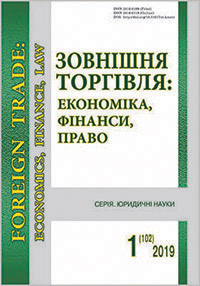Doctrinal interpretationof Article 23(2) of the International Covenant on Civil and Political Rights
DOI:
https://doi.org/10.31617/zt.knute.2019(102)09Keywords:
human rights, civil rights, right to marry, legal interpretation, principle of non-discrimination.Abstract
The article examines the viability of a broad interpretation of Article 23 (2) ICCPRas a potential legal basis for the human right to conclude a marriage. The author goes on to discuss the issue of interpretation of the commented provision in light of interpretative directives enshrined in Article 31 of the Vienna Convention on the Law of Treaties, having presented the relevant decision of the UN Human Rights Committee in case Joslin et al. v. New Zealand and its scientific criticism. The author argues that while in principle the wording of Article 23 (2) does not impede its dynamic interpretation resulting in States-Parties’ obligation to recognize same-sex marriages, the adoption of such an approach by the Committee would be premature due to the lack of the international consensus with regard to the issue in question.
References
Gerber, P.,Tay, K., & Sifris, A. (2015). Marriage: A Human Rights for All? Sidney Law Review. vol. 36, 4 [in English].
Paladini, L. (2014). Same-sex Couples Before Quasi-Jurisdictional Bodies: The Case of the UNHuman Rights Committee, in: D. Gallo, L. Paladini, P. Pustorino, Same-Sex Couples before National, Supranational and International Jurisdictions. Berlin, Heidelberg [in English].
Burchill, R. (2004). Rights of the Family and Children, in: A. Conte, S. Davidson, R. Burchil, Defining Civil and Political Rights. The Jurisprudence of the United Nations Human Rights Committee. Aldershot [in English].
Ghandi, S. (1995). Family and Child Rights, in: D. Harris, S. Joseph, The International Covenant on Civil and Political Rights and United Kingdom Law. Oxford [in English].
Minister of Home Affairs v. Fourie; Lesbian and Gay Equality Project v. Minister of Home Affairs (2005). Retrieved from http://www.saflii.org/za/cases/ZACC/2005/19.html [in English].
Nowak, M. (2012).U.N. Covenant on Civil and Political Rights: CCPR Commentary. Kehl [in English].
Sękowska-Kozłowska, K. (2005). Ochrona małżeństwa i rodziny, in: R. Wieruszewski (Ed.), Międzynarodowy Pakt Praw Obywatelskich (Osobistych) i Politycznych. Warszawa [in Polish].
Human Rights Council, Discriminatory Laws and Practices and Acts of Violence against Individuals Based on their Sexual Orientation and Gender Identity, 19th session, UN Doc A/HRC/19/41 (17 November 2011), para. 68. Retrieved from https://documents-dds-ny.un.org/doc/UNDOC/GEN/G11/170/75/PDF/G1117075.pdf?Op [in English].
Garlicki, L. (2010). Prawo do zawarcia małżeństwa. L. Garlicki (Ed.), Konwencja o OchroniePraw Człowieka i Podstawowych wolności. T. I. Komentarz do artykułów 1-18. Warszawa [in Polish].
Wyrozumska, A. (2006). Umowy międzynarodowe. Teoria i praktyka. Warszawa [in Polish].
Morawski, L. (1997). Wstęp do prawoznawstwa. Toruń [in Polish].
Torres Vasquez, A. (2001). Introdicción al Derecho. Teoría general del derecho. Bogotá [in Polish].
Badeni, G. (2006). De derecho constitucional, T. 1. Buenos Aires [in English].
Kałduński, M. M. (2005). Kilka słów na temat interpretacji w prawie międzynarodowym.Uwagi na tle uchwały Sądu Najwyższego z 19 lutego 2003 r. (I KZP 47/02). L. Morawski (Ed.) Wykładnia prawa i inne problemy filozofii prawa. Toruń [in Polish].
Hesse, K. (1993). Grundzüge des Verfassungsrechts der Bundesrepublik chland. Heidelberg [in Duets’].
Bidart Campos, G. J. (1989). Teoría General de los derechos humanos, México.
Pavcnik. M. (2005). Interpretation and Understanding of the Constitution, in: P. Winczorek, Teoria i praktyka wykładni prawa. Warszawa [in Polish].
Frankowska, M. (2007). Prawo traktatów. Warszawa [in Polish].
Morawski, L. (2005). Zasady wykładni prawa. Toruń [in Polish].
Pietrzykowski, T. (2005). Etyczne problemy prawa. Zarys wykładu. Katowice [in Polish].
Gray, J. S. (2004). Rawls’ Principle of Justice as Fairness and its Application to the Issue of Same-Sex Marriage. South African Journal of Philosophy. Vol. 23, 2[in English].
Rawls, J. (1999). A Theory of Justice. Revised Edition, Cambridge. Massachusetts [in English].
Joseph, S., Castan, M. (2013). The International Covenant on Civil and Political Rights: Cases, Materials and Commentary. Oxford [in English].
Additional Files
Published
How to Cite
Issue
Section
License
Copyright (c) 2022 Foreign trade: Economics, Finance, Law

This work is licensed under a Creative Commons Attribution 4.0 International License.
This work is licensed under a Creative Commons Attribution 4.0 International (CC BY 4.0)







